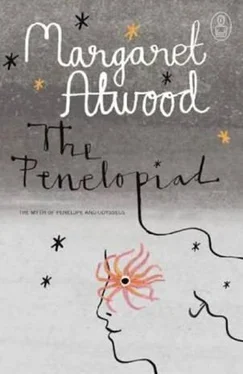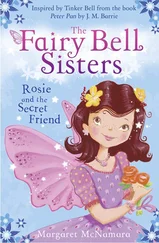XXIII. Odysseus and Telemachus Snuff the Maids
I slept through the mayhem. How could I have done such a thing? I suspect Eurycleia put something in the comforting drink she gave me, to keep me out of the action and stop me from interfering. Not that I would have been in the action anyway: Odysseus made sure all the women were locked securely into the women’s quarter.
Eurycleia described the whole thing to me, and to anyone else who would listen. First, she said, Odysseus still in the guise of a beggar watched while Telemachus set up the twelve axes, and then while the Suitors failed to string his famous bow. Then he got hold of the bow himself, and after stringing it and shooting an arrow through the twelve axes thus winning me as his bride for a second time—he shot Antinous in the throat, threw off his disguise, and made mincemeat of every last one of the Suitors, first with arrows, then with spears and swords. Telemachus and two faithful herdsmen helped him; nevertheless it was a considerable feat. The Suitors had a few spears and swords, supplied to them by Melanthius, a treacherous goatherd, but none of this hardware was of any help to them in the end.
Eurycleia told me how she and the other women had cowered near the locked door, listening to the shouts and the sounds of breaking furniture, and the groans of the dying. She then described the horror that happened next.
Odysseus summoned her, and ordered her to point out the maids who had been, as he called it, ‘disloyal’. He forced the girls to haul the dead bodies of the Suitors out into the courtyard including the bodies of their erstwhile lovers and to wash the brains and gore off the floor, and to clean whatever chairs and tables remained intact.
Then Eurycleia continued he told Telemachus to chop the maids into pieces with his sword. But my son, wanting to assert himself to his father, and to show that he knew better—he was at that age - hanged them all in a row from a ship’s hawser.
Right after that, said Eurycleia—who could not disguise her gloating pleasure—Odysseus and Telemachus hacked off the ears and nose and hands and feet and genitals of Melanthius the evil goatherd and threw them to the dogs, paying no attention to the poor man’s agonised screams. ‘They had to make an example of him,’ said Eurycleia, ‘to discourage any further defections.’
‘But which maids?’ I cried, beginning to shed tears. ‘Dear gods—which maids did they hang?’
‘Mistress, dear child,’ said Eurycleia, anticipating my displeasure, ‘he wanted to kill them all! I had to choose some—otherwise all would have perished!’
‘Which ones?’ I said, trying to control my emotions.
‘Only twelve,’ she faltered. ‘The impertinent ones. The ones who’d been rude. The ones who used to thumb their noses at me. Melantho of the Pretty Cheeks and her cronies—that lot. They were notorious whores.’
‘The ones who’d been raped,’ I said. ‘The youngest. The most beautiful.’ My eyes and ears among the Suitors, I did not add. My helpers during the long nights of, the shroud. My snow-white geese. My thrushes, my doves.
It was my fault! I hadn’t told her of my scheme.
‘They let it go to their heads,’ said Eurycleia defensively. ‘It wouldn’t have done for King
Odysseus to allow such impertinent girls to continue to serve in the palace. He could never have trusted them. Now come downstairs, dear child.
Your husband is waiting to see you.’
What could I do? Lamentation wouldn’t bring my lovely girls back to life. I bit my tongue. It’s a wonder I had any tongue left, so frequently had I
bitten it over the years.
Dead is dead, I told myself. I’ll say prayers and perform sacrifices for their souls. But I’ll have to do it in secret, or Odysseus will suspect me, as well.
There could be a more sinister explanation. What if Eurycleia was aware of my agreement with the maids of their spying on the Suitors for me, of my orders to them to behave rebelliously? What if she singled them out and had them killed out of resentment at being excluded and the desire to retain her inside position with Odysseus?
I haven’t been able to confront her about it, down here. She’s got hold of a dozen dead babies, and is always busy tending them. Happily for her they will never grow up. Whenever I approach and try to engage her in conversation she says, ‘Later, my child. Gracious me, I’ve got my hands full! Look at the itty pretty a wuggle wuggle woo!’
So I’ll never know.
XXIV. The Chorus Line: An Anthropology Lecture
Presented by: The Maids
What is it that our number, the number of the maids the number twelve suggests to the educated mind? There are twelve apostles, there are twelve days of Christmas, yes, but there are twelve months, and what does the word month suggest to the educated mind? Yes? You, Sir, in the back? Correct! Month comes from moon, as everyone knows. Oh, it is no coincidence, no coincidence at all, that there were twelve of us, not eleven and not thirteen, and not the proverbial eight maids a-milking!
For we were not simply maids. We were not mere slaves and drudges. Oh no! Surely we had a higher function than that! Could it be that we were not the twelve maids, but the twelve maidens? The twelve moon-maidens, companions of Artemis, virginal but deadly goddess of the moon? Could it be that we were ritual sacrifices, devoted priestesses doing our part, first by indulging in orgiastic fertility-rite behaviour with the Suitors, then purifying ourselves by washing ourselves in the blood of the slain male victims such heaps of them, what an honour to the Goddess!—and renewing our virginity, as Artemis renewed hers by bathing in a spring dyed with the blood of Actaeon? We would then have willingly sacrificed ourselves, as was necessary, re-enacting the dark-of-the-moon phase, in order that the whole cycle might renew itself and the silvery new-moon-goddess rise once more. Why should Iphigenia be credited with selflessness and devotion, more than we?
This reading of the events in question ties in excuse the play on words with the ship’s hawser from which we dangled, for the new moon is a boat.
And then there’s the bow that figures so prominently in the story—the curved old-moon bow of Artemis, used to shoot an arrow through twelve axe-heads—twelve! The arrow passed through the loops of their handles, the round, moon-shaped loops! And the hanging itself—think, dear educated minds, of the significance of the hanging! Above the earth, up in the air, connected to the moon-governed sea by an umbilical boat-linked rope oh, there are too many clues for you to miss it!
What’s that, Sir? You in the back? Yes, correct, the number of lunar months is indeed thirteen, so there ought to have been thirteen of us. Therefore, you say smugly, we might add that our theory about ourselves is incorrect, since we were only twelve. But wait—there were in fact thirteen! The thirteenth was our High Priestess, the incarnation of Artemis herself. She was none other than yes! Queen Penelope!
Thus possibly our rape and subsequent hanging represent the overthrow of a matrilineal moon-cult by an incoming group of usurping patriarchal father-god-worshipping barbarians. The chief of them, notably Odysseus, would then claim kingship by marrying the High Priestess of our cult, namely Penelope.
No, Sir, we deny that this theory is merely unfounded feminist claptrap. We can understand your reluctance to have such things brought out into the open rapes and murders are not pleasant subjects—but such overthrows most certainly took place all around the Mediterranean Sea, as excavations at prehistoric sites have demonstrated over and over.
Surely those axes, so significantly not used as weapons in the ensuing slaughter, so significantly never explained in any satisfactory way by three thousand years of commentary—surely they must have been the double-bladed ritual labrys axes associated with the Great Mother cult among the
Читать дальше












